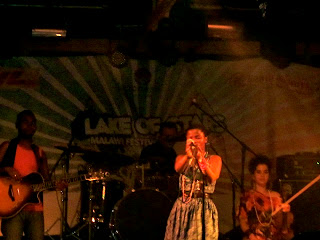Thinking about the difference between this
weekend and last weekend is one to smile about. Last weekend, we decided to bus
south to outside of Thyolo to a large celebration of one of the main cultures
in southern Malawi – the Lhomwe. Since the President Mutharika is Lhomwe, he
decided to build a cultural centre to preserve the Lhomwe language, dance,
songs and traditions. I do not quite support the idea of a cultural centre for
only one group and not the tens of others in the country, but I thought it
would be nice to see how people celebrate.
 |
| Cooling off with freezies under the shade on my new mulako wa lhomwe chitenje |
So off we went last Sunday by
minibus to Mulako wa Lhomwe, not sure what to expect exactly, other than a lot
of people. The minibus dropped us in what seemed like the middle of nowhere
amongst a sea of thousands of people, and we wandered into the grounds still
not sure what was going on. We did get there after lunch and missed most of the
real action, but we did get a glimpse of some dancers, some of which
spontaneously paraded behind while we were walking. Although I get stares and
questions daily, I am not sure I have felt like I was sticking out that much
before. But I understand people’s curiosity and with a pile of strawberry
freezies in hand, we enjoyed the few hours we spent there before cramming into
another full minibus to come home.
 |
| Example of things people were wearing to celebrate |
Contrastingly, this weekend we celebrated
our own culture by dressing up in costumes and eating candy. Entertaining our
5-year old selves by transforming into ninja turtles for a night has value for
refreshing ourselves and feeling connected to what is going on back home.
Plus,
I love getting creative and crafty, since making costumes here is a little bit
different than at home, considering Halloween is not celebrated at all here.
But the outdoor market presents endless possibilities if you are willing to get
a little creative.
Just a little note to say I am doing well
and enjoying both Malawian and Western culture! I also had meetings on the
World AIDS Campaign and HIV leadership through accountability in Lilongwe this
week, which was quite educational and highlighted the challenges that civil
society organizations here face in trying to get the government to follow
through on their commitments to stocking central stores with ARVs and essential
drugs, nutritional supplements for people on ARVs, etc.
More on work later, now that the rainy
season is fast approaching, it is incredibly hot so I am starting to work and
think at a slower pace.
 |
| Heros in a half shell - turtle power! |



















